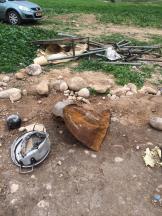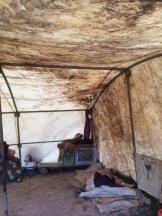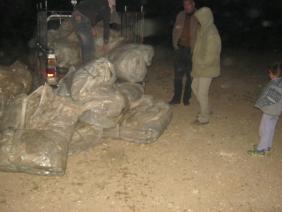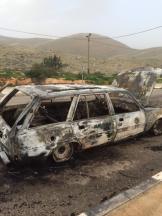
On the eve of the big storm we hurry to the Jordan Valley, to Umm Jamal in Ein el Hilweh, where on the first day of the new year (1.1.2015) the homes of 80 people have been demolished. Everyone, including their livestock, remained without shelter, thanks to the complete indifference of the occupation authorities.

The remains of an oven and cookware at the destroyed encampment.
A baby sleeps beneath a pile of blankets.
sleeps beneath a pile of blankets.
The plastic sheeting arrives.
A tent donated by the Red Cross.
The remains of the burned vehicle.
10:30 Tapuach checkpoint.
No soldiers at the checkpoint or at the hitchhiking stations to the north and south of the junction. Nor are there any hitchhikers on this cold morning.
10:50 Ma’aleh Ephrayim.
Not manned. The soldiers are holed up in the guard tower (the pillbox).
11:30 Hamra checkpoint.
No lines. The stone walls erected on the side of the road have for now blocked the flow of mud which would have been caused by the rains. We’ll see what happens during the coming storm.
We first visited the Darajma family at Maskiyot junction to pick up M., whom I’d arranged the previous day to meet so he can take us to Umm Jamal. It’s very cold and the entire family is crowded around a fire in the guest tent, while the children gather twigs and feed the flames.

Umm Jamal
There are a number of tents which were donated after the demolition by neighbors in nearby encampments, shepherds like them and like them very poor. They can donate only what they’re not using themselves – torn, filthy tents. There are also a few small tents donated by the Red Cross, like picnic tents, which aren’t waterproof. Piles of bent pipes, which had supported the tents before they were destroyed, are strewn around. There are puddles of rainwater in the tents from the night before last. Some of the mattresses are also wet.
We’ve known Muhammad Khadir Darajma for eight years; he was then a twelve year old shepherd, walking barefoot and freezing alongside the road. Since then he’s often run to meet us with a pot of tea. He’s grown into a wonderful young man who supports his family, including his father who had lost a leg to a mine, and two younger brothers aged 12 and 16. Their miserable encampment was demolished a second time on the morning of 1.1.15, one month after it was destroyed by the occupation’s brutes. Life in the shadow of the repeated demolitions is unbearable. They’re very poor anyway, don’t have anything, and they find it difficult to survive from day to day. That must be why the IDF keeps coming back to them – maybe it’s easier to break those who are helpless and expel them to Area A on the West Bank. But, as one of them said, “There’s no place for us in Area A.”

We visited Fatma Ka’abana in her dripping tent. She has 11 children; the youngest, a year and a half old, is asleep in the corner, completely covered by a pile of blankets. She’s pregnant. Fatma asked us to find out why the Red Cross hasn’t given them solar panels (for electricity) that other encampments had received. Without even partial electricity life is very difficult, especially in the summer. Then we met her husband and his brothers. At first they were very hesitant, full of hatred at Israel (I’m always surprised that the local inhabitants don’t express hatred for Israel after such brutal attacks on them). After a while they softened, at least toward us.

The visit took place against the background of the big storm which has begun this evening; the Israeli and Palestinian media have been warning of it constantly. How can the people here protect themselves from the rain and wind and cold in their worn, torn tents? We began looking for plastic sheeting to cover the tents so water wouldn’t enter. The prices were high, and we were unable to find someone to deliver immediately. M. tried to ask locals he knew, unsuccessfully.
In the evening he telephoned to say he’d found someone with plastic sheeting that wasn’t top quality but was strong and durable, and not expensive. He paid with his own money, rented a pickup truck and drove to get it. In the middle of the night, after he somehow got through the IDF checkpoints, he gave two rolls to each family. Two days later Rachel and Revital brought him the money that had been collected to pay for them. On Thursday Muhammad from Umm Jamal telephoned – they all received plastic sheeting. They’re still dry. It was embarrassing to be thanked.

13:45 Tayasir checkpoint.
A line of 20 cars in each direction. The reason – a Palestinian car (a 1987 Peugeot) caught fire at the checkpoint. The soldiers tried to extinguish the fire with two jerrycans of water, but the gas in the tank burned fiercely and after twenty minutes only a charred chassis remained. And that’s all the soldiers could offer when a car is on fire? Is it possible there are no fire extinguishers at the checkpoint? Only after the fire had burned out an Israeli fire truck arrived and sprayed water on the dense smoke. We waited with the driver for the insurance agent and cars again began going through, slowly. People who’d risen at 2 AM, worked all day in the fields of the settlements, impatient to get home… while the soldiers - langsam langsam, they have all the time in the world. “Where are you going…” What do you have there…? The woman next to you, what’s her connection to you?...” It took a long time for the line to vanish.
We left at 15:30.
